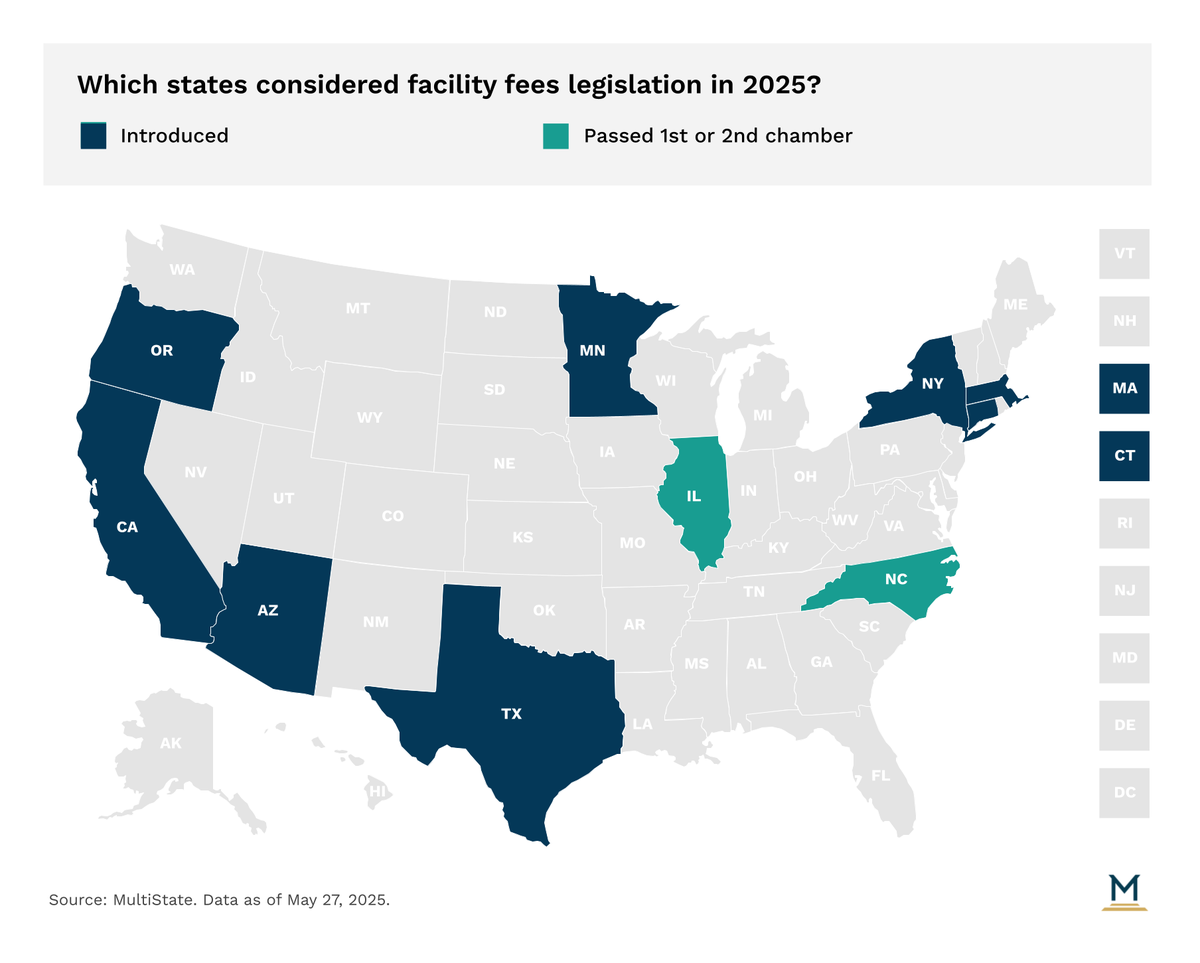
Health Care & Wellness
Pharmacy Benefit Manager (PBM) Legislation Tackled Ownership Restrictions, Transparency, and More in 2025
January 27, 2026 | Lisa Kimbrough
September 8, 2025 | Mary Kate Barnauskas

Key Takeaways:
The term facility fees typically refers to charges by hospitals to cover costs beyond what is billed by providers. In recent years, facility fees have been increasingly used to cover outpatient services delivered in settings owned or controlled by hospital systems. While providers have argued that the fees are necessary to support overhead costs and ensure appropriate reimbursement for the total cost of care, insurers have contended that facility fees in non-hospital settings are unfair and mark-up costs for consumers. As hospital ownership of outpatient settings and physician practices has increased, more states are looking into the billing practices and taking action.
During the 2025 legislative session, 11 states considered facility fee legislation. Key trends from introduced legislation include:
Requiring health systems to report facility fee data to state agencies.
Prohibiting or limiting certain facility fees.
Establishing facility fee notice requirements for consumers.

Of note, Indiana, Illinois, and Minnesota all enacted facility legislation in 2025.
In Indiana, HB 1003 included facility fee/site neutrality provisions. As introduced, the bill required payers to reimburse a service provided in an outpatient setting at the same reimbursement rate that is provided at a physician’s office for the equivalent outpatient service. The bill was amended throughout the process and eventually only applied to state employee health plans before it was ultimately removed entirely from the bill. Of note, the enacted bill did incorporate provisions relating to services provided in office settings, including modifying the definition of “office setting,” prohibiting a provider in an office setting from billing with hospital place or service codes, and establishing remedies for payers concerning location of service errors in payment.
Illinois also enacted facility fee legislation with HB 1431. The bill originally included facility fee notice requirements, prohibitions, and billing requirements, but amendments pared the bill down significantly to only require a hospital that charges a facility fee for outpatient services that is separate and distinct from a professional fee to develop a policy to inform patients that they may be subject to a facility fee. Additionally, Minnesota’s Health and Human Services Omnibus policy and appropriations bill (HF 2) established facility fee reporting requirements for hospitals.
There is growing interest in facility fees, with stakeholder groups considering model legislation on facility fees and site neutrality. The National Academy of State Health Policy (NASHP) published the first influential model legislation in 2020. The model legislation seeks to prohibit certain site-specific and service-specific facility fees. More recently, in April 2025, the National Council of Insurance Legislators (NCOIL) approved the Improving Affordability for Patients Model Act, which would prohibit certain facility fees and establish facility fee transparency, reporting, and billing requirements. In addition, the American Legislative Exchange Council (ALEC) finalized similar model legislation, the Site Neutral Payment Act, this year. This increased focus by stakeholder groups suggests a high potential of more legislative action on facility fees in 2026.
StateVitals is the leading resource on how state governments are shaping healthcare policy and transforming care and delivery, brought to you by MultiState’s Health Care Policy Practice. MultiState’s policy and advocacy professionals are uniquely positioned to give you and your organization the big-picture view on state health policy reform, plus the latest trends on how policymakers are thinking about healthcare and similar emerging issues. Learn more about StateVitals, or schedule a demo here.

January 27, 2026 | Lisa Kimbrough

January 27, 2026 | Amber Thyson

January 23, 2026 | Mary Kate Barnauskas